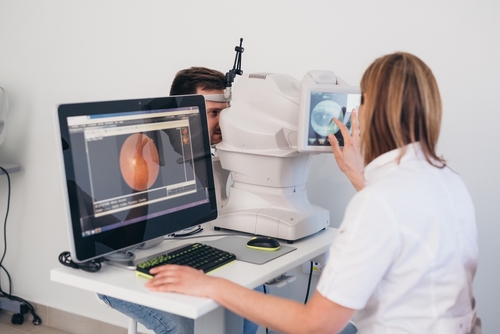
The eye is a fascinating and complex organ. It has many different parts that work together to create the ability to see.
One of the most important of these parts is the retina. A healthy retina is vital to experiencing clear vision.
When issues arise within the retina, vision is almost always affected, sometimes permanently. Keep reading to learn what the retina does!
What Exactly Is the Retina?
The retina is a thin sheet of tissue that lines the back wall of the inner eye. This sheet of tissue contains countless specialized cells.
These cells are called photoreceptors. They are sensitive to light and come in two varieties: rods and cones.
Rods and cones are named as such because of the cells’ shapes. Rods are thin and cylindrical, while cones are conical.
However, they also serve different purposes. For example, rods assist with low-light vision, while cones process color and enable normal sight.
The center part of your retina is called the macula. The macula is most dense with photoreceptors, and is responsible for central vision.
The macula allows for clear central vision, while the peripheral retina takes in information from your surroundings. The retina is connected to your brain via the optic nerve.
When the photoreceptors in the retina detect light, they send signals through the nerve almost instantly. In healthy eyes, this creates vision.
However, the retina is as fragile as it is powerful, and any problems with it can be a serious threat to your vision.
What Are Some Common Retinal Problems?
Eye problems like nearsightedness or cataracts affect how light lands on the retina. Without light, vision is not possible.
Retinas are unique because they are able to translate light into information. It is very important to take care of your eyes, especially your retinas.
Here are some problems your eye doctor in Baltimore might look for during an eye exam at Levin Eyecare:
Macular Degeneration
Macular degeneration occurs when the photoreceptors in the center of the retina begin to die and degrade. This eye condition can drastically affect central vision, making it hard to recognize faces or read.
Like many other problems, your best chance at saving your sight from macular degeneration is by getting help as soon as possible. There is no cure for macular degeneration, but certain treatments and therapies have been shown to slow or halt its progression.
Diabetic Retinopathy
As a complication of diabetes, uncontrolled blood sugar can also impact your vision. High blood sugar damages blood vessels, including the ones in your eyes.
As the blood vessels leak and create scar tissue, your vision can be damaged quickly. If you are in the early stages of diabetic retinopathy, you can likely fix the issue by getting your blood sugar under control.
As it progresses, diabetic retinopathy becomes more challenging to treat, often needing surgery or injections.
Retinal Tear or Detachment
The retina is attached to the back wall of the eye, which means it can detach. Usually, detachment begins as a tear in the retina.
As fluid pools behind the tissue, the entire retina can be pushed away. In order to save whatever sight possible, surgery needs to be performed as soon as possible. Again, early detection is critical.
Do you want to learn more about how you can keep your retina healthy and your vision clear? Schedule an appointment at Levin Eyecare in Baltimore, MD, today!

